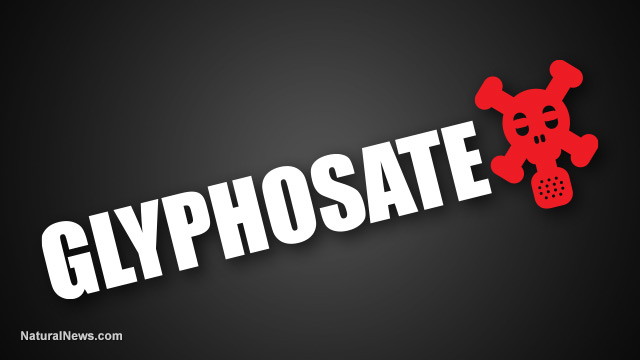Poll: two out of every three Europeans wants glyphosate eradicated from the continent
Tuesday, July 12, 2016 by: Daniel Barker
Tags: glyphosate, EU ban, weed killer chemical

(NaturalNews) Despite industry-led efforts to play down health and environmental risks associated with the herbicide glyphosate, two-thirds of Europeans now say that its use should be banned, according to a recent survey of more than 7,000 people from the five biggest E.U. states.
The European Parliament responded to the public's concerns on Wednesday, April 20, by passing a resolution opposing the European Commission's proposal to re-approve the use of glyphosate for the next 15 years.
This move may lead to a potential victory for the anti-GM agriculture movement in Europe, and signals a growing awareness of the dangers of what has become the most widely-used herbicide in the history of the world.
From The Ecologist:
"The Parliament's vote precedes a decision by EU government representatives on whether or not to support the Commission proposal to approve glyphosate for use in the EU. This may take place at the next EU pesticides committee meeting on 18-19 May.
"While the 374 to 225 vote is non-binding on the Commission and EU governments, it will nonetheless carry strong moral weight since it comes from the EU's only elected body directly representing EU citizens and will force a discussion of the issues raised."
Monsanto propaganda debunked
The Monsanto Company, whose number one-selling Roundup herbicide product contains glyphosate, has long led a massive propaganda and lobbying campaign promoting the use of glyphosate as part of a "safe and effective" (it is neither) industrial-scale agricultural system based on GM technology. However, a growing body of research has shown that glyphosate negatively impacts human health and damages ecosystems.Monsanto's lies and strong arm tactics – which have included falsified research, the bribing of scientists, payoffs to political committees and the launching of smear campaigns against GMO opponents – have not been entirely successful in keeping the truth from the public.
And the truth is, that glyphosate poses a threat not only to humans – it's been linked to cancer in lab animals and has been labeled as "probably carcinogenic" to humans by the World Health Organization – but also disrupts ecosystems, by killing off beneficial species that help maintain the delicate balance of their environment.
From The Guardian:
"Most global use of glyphosate is for GM-resistant crops and, as a non-selective herbicide, environmentalists say that it can kill all plants, algae, bacteria and fungi in a crop's vicinity, creating knock-on effects for biodiversity.
"Some 9.4m tonnes of glyphosate have been applied to crops since 1974, enough to spray half a pound of Roundup onto every cultivated acre of land on the planet."
Studies have shown that glyphosate threatens many animal species as well, including insects, fish and amphibians.
Nearly half of Europeans test positive for glyphosate in their bodies
Glyphosate is everywhere – traces of it have been found in the urine of 44 percent of people tested from 18 different European nations, in 60 percent of the bread sold in the U.K., and in Germany's 14 best-selling beers.However, little testing has actually been done examining the extent of glyphosate's presence and its effects on humans and the environment, which is one big reason why environmental groups and others are demanding a ban – at least until more research can be conducted.
From a report published by Friends of the Earth Europe:
"The evidence suggests that a significant proportion of the population could have glyphosate in their bodies – and it is not clear where it is coming from. Despite the fact that glyphosate is the world's best-selling chemical herbicide and glyphosate-containing herbicides are the most widely-used herbicides in Europe, very little testing is done for glyphosate residues in food, feed, or water. Tests for glyphosate in the body do not take place at all."
More testing is needed, of course, but there is already more than enough evidence of glyphosate's harmful effects and its increasing levels found in foods, to support a complete ban of its use.
Two-thirds of Europeans think so, and it seems that their representatives in the EU governmental system may be beginning to pay attention.
Sources:
TheGuardian.com
TheEcologist.org
Science.NaturalNews.com
FoeEurope.org[PDF]
Glyphosate at FETCH.news
Get independent news alerts on natural cures, food lab tests, cannabis medicine, science, robotics, drones, privacy and more.
Take Action: Support Natural News by linking to this article from your website
Permalink to this article:
Embed article link: (copy HTML code below):
Reprinting this article:
Non-commercial use OK, cite NaturalNews.com with clickable link.
Follow Natural News on Facebook, Twitter, Google Plus, and Pinterest
- Newly released JFK files reveal Pentagon's role in creating Lyme disease and covid in the same lab
- The hidden dangers in your kitchen: How cooking methods impact diabetes, cancer and aging
- DEADLY DECEPTION: How COVID vaccines increased mortality rates and why authorities hid the truth
- CDC finally halts $11 billion COVID funding scam as health officials admit the ‘pandemic’ was a fraud
- Arkansas embraces medical freedom with landmark ivermectin law
- GAIN-OF-FUNCTION CAT-BIRD-FLU now on the rise as nearly a dozen cats in Colorado "test positive" for Bird Flu due to contaminated cat food
- Lab leak confirmed? Boris Johnson's stunning reversal on COVID origins sparks global debate
- Home gardening for preppers: A beginner's guide to growing your own food
- Cartels shift tactics: Kidnappings and organ trafficking surge as border crossings plummet under Trump policies
- Trump's greatest betrayal so far: Accelerating Middle East wars, silencing dissent, and serving Zionist masters
- Why you should think twice before buying mainstream toothpaste formulas
- Was JFK's assassination orchestrated by a CIA double agent? New evidence points to James Angleton as the “architect”
- ATTENTION PRESIDENT TRUMP: Please WITHDRAW your nomination of Dr. Susan Monarez for CDC Director as she is a VAX FANATIC and TOXIC JAB ZEALOT
- Key nodes of Federal Government censorship
- Record honeybee deaths devastate U.S. agriculture, pesticides under scrutiny
- Speaker Johnson warns Congress may defund or disband rogue courts targeting Trump
- Paper or plastic? The environmental deception behind bag bans
- Judicial bias exposed: Judge who blocked Trump's gang deportations attended secretive left-wing conference
- Newly released JFK files reveal Pentagon's role in creating Lyme disease and covid in the same lab
- Elon Musk: Aliens could be here on Earth RIGHT NOW
- Festive flavors: The sweet history, nutritional profile and health benefits of pecan pie
- Trump reverses course on Gaza plan, says “nobody is expelling Palestinians”
- Reclaim your health: How midlife exercise reverses years of inactivity
- Big Pharma's $8 Billion bribery scheme exposed: how doctors are pushed to prescribe junk science, not heal
- Boys are back in town: Trump’s patriotic alpha crew takes the wheel while toxic females ride in the backseat
- EPA advisor admits the agency is funneling billions to climate groups ahead of Trump’s return to White House
- Space war brewing? Russia threatens to destroy Starlink satellites
- Survival 101: Effective EMF blocking techniques
- A lack of integrity in Academia: Harvard professor found GUILTY of fraudulent research to promote CRT theory
- Mike Adams Sermon 66: God will DESTROY ISRAEL for its wickedness
- 5 Simple steps to boost your brainpower: How to strengthen executive function in a distracted world
- Rep. Nancy Mace introduces bill to ban biological males from female facilities on federal property
- Sugarcane extract superior to cholesterol-lowering drugs?
- WHO focusing more on policing speech about public health and implementing global surveillance systems
- Pilots report mysterious lights 'moving at extreme speeds' across Oregon skies
- Dr. Mike Yeadon releases 15-minute testimony - WATCH - about genocidal intent of COVID “vaccines”
- EPA advisor admits the agency is funneling billions to climate groups ahead of Trump’s return to White House
- The Health Ranger releases “Vaccine Zombie” song and music video, using AI-animated zombies for the music video
- California's social media censorship law struck down: A victory for free speech or a threat to online safety?
- Dr. Mike Yeadon releases 15-minute testimony - WATCH - about genocidal intent of COVID “vaccines”
- The pandemic as a tool for INDOCTRINATION: Understanding “The Indoctrinated Brain” by Dr. Michael Nehls
- Florida takes a stand: DeSantis proposes permanent ban on mRNA vaccine mandates
- Mike Adams releases country western hit single: Goin’ Back in Time is Comin’ Home
- Mike Adams releases music poetry sensation: A Child of God
- “Why we influenced the 2020 elections”: Facebook files reveal the coordinated effort to bury the Hunter Biden laptop story
- RFK Jr. clears key hurdle: Sen. Susan Collins backs controversial HHS nominee, signaling a new era for health policy
- Unpacking the Lies That We’ve Been Fed – new song and music video released by Mike Adams, the Health Ranger
- Mike Adams releases new song and music video: Nothing More Disgusting Than a Globalist
- Newly released JFK files reveal Pentagon's role in creating Lyme disease and covid in the same lab
- Congratulations to the FULLY UNVACCINATED as you resisted the COVID-19 PROPAGANDA MACHINE fueled by over $100 BILLION
- Michigan sheriff announces criminal investigation into 2020 election crimes, Dominion Voting Systems
- Israeli soldiers accused of even more torture and abuse in the West Bank
- Migrants are taking advantage of recent hurricanes to scam residents and loot their homes
- House Intelligence Committee calls for the ARREST and PROSECUTION of Dr. Anthony Fauci
- Red Cross issues warning to stop blood plasma donations from vaccinated people
- Scientists confirm: GENIUS brain function can be spontaneously unleashed in humans without any apparent cause
- EPA advisor admits the agency is funneling billions to climate groups ahead of Trump’s return to White House
- HYSSOP: What research reveals about the health benefits of this ancient holy herb
- Two containers with completed ballots fall out of truck in Florida
- Fully vaccinated about to see “tsunami” of illness and death, warns virologist
- Global leaders unite to clamp down on “misinformation” with UN-backed Cascais Declaration
- BREAKING: 2025 NDAA authorizes mandatory military draft of WOMEN across America… as Pentagon pursues global NUCLEAR war with both Russia and China at the same time
- Michael Yon warns of a ZIONIST TAKEOVER in Trump’s second administration
- BOMBSHELL: DNA testing kits are a SCAM to develop ethnic-specific bioweapons
- Ozempic and Wegovy weight loss drugs are injectable LIZARD VENOM PEPTIDES that may unleash a devastating wave of organ failure… side effects align with symptoms of SNAKE BITES
- Israeli soldiers accused of even more torture and abuse in the West Bank
- These 13 countries just signed an agreement to engineer a global FAMINE by destroying food supply
- NASA admits that climate change occurs because of changes in Earth’s solar orbit, and NOT because of SUVs and fossil fuels
- RFK Jr. clears key hurdle: Sen. Susan Collins backs controversial HHS nominee, signaling a new era for health policy
- Sermon 30: How Jesus reveals Caesar’s FAKE CURRENCY and FALSE AUTHORITY
- Coriander seeds: Ancient medicine backed by modern science
- Arizona officials claim Maricopa County needs 10-13 days to tabulate results of the election
Science News & Studies
Medicine News and Information
Food News & Studies
Health News & Studies
Herbs News & Information
Pollution News & Studies
Cancer News & Studies
Climate News & Studies
Survival News & Information
Gear News & Information
News covering technology, stocks, hackers, and more



"Big Tech and mainstream media are constantly trying to silence the independent voices that dare to bring you the truth about toxic food ingredients, dangerous medications and the failed, fraudulent science of the profit-driven medical establishment.
Email is one of the best ways to make sure you stay informed, without the censorship of the tech giants (Google, Apple, Facebook, Twitter, YouTube, etc.). Stay informed and you'll even likely learn information that may help save your own life."
–The Health Ranger, Mike Adams












































